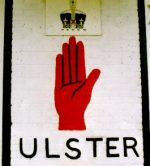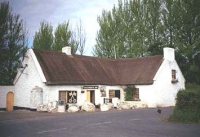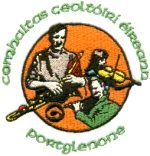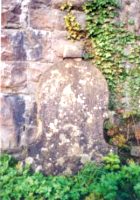FolkWorld article by Walkin' T:-)M:
The Sound of Rain
Diddle-dee-diddle in the North of Ireland
According to an ancient Irish Legend, Chieftain O'Neill found
himself in a struggle with another Gaelic Lord about the Kingdom of Ulster.
Both agreed to settle their dispute with a boat race. The first to touch the
far shore would win the land. From the start the race was close. Nearing shore,
O'Neill fell behind. But just before his rival landed, O'Neill grabbed his
sword, cut off his own hand and hurled it forward. The bloody hand touched
the shore the instant before his opponent landed.
 I didn't follow his example, for, unlike O'Neill, I still wanted both hands
to pluck some chords. I was fed up of
music behind museum's bars
and I wanted to catch the living tradition when I landed on the shores of
Ulster.
The north of the "Emerald Isle" is not only worth seen for the famous
Giant's Causeway,
but also for the picturesque Glens of Antrim.
The once quiet and remote area (made accessible by a military road)
were home to fiddler and moonshiner Mickey McIllhatton,
who learned his trade from the fairies. At least, that's what they say.
Christy Moore recorded
"McIllhatton",
which was written by Bobby Sands
in the H-Blocks. "I think of a time when some of these songs will be sung and no one will care who wrote them. The best songs outlive the significance of their authors. It becomes incidental after a time, and the songs themselves reverberate down the years."
I didn't follow his example, for, unlike O'Neill, I still wanted both hands
to pluck some chords. I was fed up of
music behind museum's bars
and I wanted to catch the living tradition when I landed on the shores of
Ulster.
The north of the "Emerald Isle" is not only worth seen for the famous
Giant's Causeway,
but also for the picturesque Glens of Antrim.
The once quiet and remote area (made accessible by a military road)
were home to fiddler and moonshiner Mickey McIllhatton,
who learned his trade from the fairies. At least, that's what they say.
Christy Moore recorded
"McIllhatton",
which was written by Bobby Sands
in the H-Blocks. "I think of a time when some of these songs will be sung and no one will care who wrote them. The best songs outlive the significance of their authors. It becomes incidental after a time, and the songs themselves reverberate down the years."
In Glenravel's Glen there lives a man whom some would call a god
For he could cure your shakes with a bottle of his stuff would cost you thirty bob
At McIlhatton's house the fairies are out and dancing on the hobs
The goat's collapsed and the dog has run away and there's salmon down the bogs
Heres a jig to the man and a reel to the drop and a swing to the girl he loves
May your fiddle play and poitín cure your company up above
It was a soft day, i.e. it was raining cats and dogs.
If you ever wanted to know how that sounds, here's the answer:
"Bliain le Baisteach"
(a year with rain). Sean Taylor and Mikael Fernström of the University
of Limerick built a computerized neural network and fed it with a database
of 1,000 Irish jigs, reels and polkas. Then they reversed input and output
and loaded the year's daily rainfall data of 200 Irish weather stations.
Various parts of the country were mapped to particular instruments, e.g.
violins to Ulster and violas to Munster. Tunes were tied to particular
stations, so that if Valentia had the highest rainfall on a particular day,
a Kerry polka would predominate. "It always hits Donegal first,"
Fernström says. "So you can hear the second violin hitting the coast
first and then the spreading of the composition through the island."
 Anyway, I was not coming for the Irish Rain Festival - Jan 1st thru to Dec 31
- as they say. It was late in the year, that means every music caught being a
genuine affair and no "Touristical Irish Music". I passed the
Crosskeys Inn, unfortunatly
burned out last year. Yet two
fund raising albums
are determined to revive the famous music pub. Nearby
Portglenone,
home of traditional band Deanta,
hosted a small music and dance festival: "Gig'n the Bann".
Three Presbyterian churches, an Orange Hall, teenagers in
motorcars driving up and down the Main Street, the radios playing the international
world beat. Friday night was getting slowly into top gear. Eventually a bunch
of kids gathered at the "Wild Duck Inn" and started the "sez".
Anyway, I was not coming for the Irish Rain Festival - Jan 1st thru to Dec 31
- as they say. It was late in the year, that means every music caught being a
genuine affair and no "Touristical Irish Music". I passed the
Crosskeys Inn, unfortunatly
burned out last year. Yet two
fund raising albums
are determined to revive the famous music pub. Nearby
Portglenone,
home of traditional band Deanta,
hosted a small music and dance festival: "Gig'n the Bann".
Three Presbyterian churches, an Orange Hall, teenagers in
motorcars driving up and down the Main Street, the radios playing the international
world beat. Friday night was getting slowly into top gear. Eventually a bunch
of kids gathered at the "Wild Duck Inn" and started the "sez".
 The session continued Saturday afternoon and was steadily growing older. Eventually
there's also an electric piano joining in. But the night was reserved for the
marquee behind the house. As the cold creeps in,
Tommy Sands
opens the night's entertainment with wit and humour. The
McNeillstown Pipe Band
is joined by the
Allen School Dancers.
Scottish piping and Irish dancing, what a combination! Hands across the devide?
Then, Robert Finnegan on the accordion transfers us to the Alps. Well, not
really, but that's what I feel about it. Willie Drennan and John Trotter
give a survey of the Ulster Scots folk tradition. The staccato beat of the odd
Lambeg drum,
must be heard for miles. Usually associated with those villainous-looking
fife and drum bands like the Cloughfern Young Conquerors: "We're a
blood-and-thunder band, kick-the-pope music. There's other bands
go for melody. We're not into that. Others play diddle dee dee wee Irish
tunes. We're just your old-fashioned traditional no messing band."
However, some argue these bands are a vital safety-valve for young people who
might otherwise become involved in paramilitary violence. Finally, Sligo's
Dervish hits the stage, driving the
audience wild. Who said Traditional Irish Music is an exclusively
Roman Catholic and Nationalistic business?
The session continued Saturday afternoon and was steadily growing older. Eventually
there's also an electric piano joining in. But the night was reserved for the
marquee behind the house. As the cold creeps in,
Tommy Sands
opens the night's entertainment with wit and humour. The
McNeillstown Pipe Band
is joined by the
Allen School Dancers.
Scottish piping and Irish dancing, what a combination! Hands across the devide?
Then, Robert Finnegan on the accordion transfers us to the Alps. Well, not
really, but that's what I feel about it. Willie Drennan and John Trotter
give a survey of the Ulster Scots folk tradition. The staccato beat of the odd
Lambeg drum,
must be heard for miles. Usually associated with those villainous-looking
fife and drum bands like the Cloughfern Young Conquerors: "We're a
blood-and-thunder band, kick-the-pope music. There's other bands
go for melody. We're not into that. Others play diddle dee dee wee Irish
tunes. We're just your old-fashioned traditional no messing band."
However, some argue these bands are a vital safety-valve for young people who
might otherwise become involved in paramilitary violence. Finally, Sligo's
Dervish hits the stage, driving the
audience wild. Who said Traditional Irish Music is an exclusively
Roman Catholic and Nationalistic business?
The next week I was strolling along the boreens. I was walking the
Mourne Mountains,
hence passing the town of Rostrevor, home of the
Sands Family.
In the Interpretative Centre of Navan Fort
(Emain Macha), the ancient capital of Ulster,
I listened to the sound of 2,000 year old bronze horns, a kind of didgeridoo
type instrument. At the Ulster American Folk Park
I got informed about Ulster-American relations and learned that the name
"hillbillies" came because the people of the Appalachian mountains sang songs about
King Billy.
 Then I was heading for the border. "There's no border anymore," I was
told, "only those between the rich and the poor." A pre-Christian
Janus figure on Boa Island
at the shores of Lower Lough Erne seems like a "symbol of the divided
Ireland: two faces inseparably connected, yet looking in opposite directions"
(F. Rathjen). The Fiddlers Stone at the entrance of Castlecaldwell commemorates
fiddler Denis McCabe who fell out of a barge into Lough Erne and drowned.
The weathered inscription from 1770 reads:
Then I was heading for the border. "There's no border anymore," I was
told, "only those between the rich and the poor." A pre-Christian
Janus figure on Boa Island
at the shores of Lower Lough Erne seems like a "symbol of the divided
Ireland: two faces inseparably connected, yet looking in opposite directions"
(F. Rathjen). The Fiddlers Stone at the entrance of Castlecaldwell commemorates
fiddler Denis McCabe who fell out of a barge into Lough Erne and drowned.
The weathered inscription from 1770 reads:
Beware ye fidlers of ye fidlers fate
Nor tempt ye deep least ye repent to late
Ye ever have been deemed to water foes
Then shun ye lake till it with whiskey floes
On firm land only exercise your skill
There you may play and drink your fill
Eventually I entered Donegal:
The book shelves were occupied with the life and wisdom of
Clannad's
Maire Brennan. Here we may learn the ups and downs of the folk business,
including a history of heavy drinking. By the way, Maire's father is still
running his famous singing pub "Leo's" in Meenaleck. Now construction works
started for a theatre, a museum, a restaurant, a shop and a small hotel.
A thriving family business, indeed. However, it's Monday night and I wasn't
into singing. My destination was the home turf
of Altan's Mairead ni Mhaonaigh,
"Teach Hudi Beags" in Bunbeg. Already at the bar there's a Canadian fiddler
diddling some of his swinging tunes. Later that night when the
session is in full swing, we have eight fiddles, including patriarch Proinsias
O Maonaigh himself, as well as whistle, guitar, mandolin, and accordion. One
Gaelic and some English songs are thrown in for good measure, but jigs & reels
dominate. Well, chiefly reels, cause that's the Donegal way.
On the way back to my B&B, the spirits high, I stepped into a deep puddle.
Now anyway, I'm coming back. It's certainly not for the rain. And there's hope:
"Perhaps in the future, by making music from rain data, we might be
able to forecast the weather through musical expectation?"
(M. Fernström)
Bibliography:
Maire Brennan: The Other Side of the Rainbow, Hodder & Stoughton 2000 (dt. Mein irisches Leben, Brunnen-Verlag 2001)
Christy Moore: One Voice - My Life in Song, Hodder & Stoughton 2000

Back to the content of FolkWorld Articles, Live Reviews & Columns
To the content of FolkWorld online magazine Nr. 18
© The Mollis - Editors of FolkWorld; Published 4/01
All material published in FolkWorld is © The Author via FolkWorld. Storage for private use is allowed and welcome. Reviews and extracts of up to 200 words may be freely quoted and reproduced, if source and author are acknowledged. For any other reproduction please ask the Editors for permission.
FolkWorld - Home of European Music

Layout & Idea of FolkWorld © The Mollis - Editors of FolkWorld
 I didn't follow his example, for, unlike O'Neill, I still wanted both hands
to pluck some chords. I was fed up of
music behind museum's bars
and I wanted to catch the living tradition when I landed on the shores of
Ulster.
The north of the "Emerald Isle" is not only worth seen for the famous
Giant's Causeway,
but also for the picturesque Glens of Antrim.
The once quiet and remote area (made accessible by a military road)
were home to fiddler and moonshiner Mickey McIllhatton,
who learned his trade from the fairies. At least, that's what they say.
Christy Moore recorded
"McIllhatton",
which was written by Bobby Sands
in the H-Blocks. "I think of a time when some of these songs will be sung and no one will care who wrote them. The best songs outlive the significance of their authors. It becomes incidental after a time, and the songs themselves reverberate down the years."
I didn't follow his example, for, unlike O'Neill, I still wanted both hands
to pluck some chords. I was fed up of
music behind museum's bars
and I wanted to catch the living tradition when I landed on the shores of
Ulster.
The north of the "Emerald Isle" is not only worth seen for the famous
Giant's Causeway,
but also for the picturesque Glens of Antrim.
The once quiet and remote area (made accessible by a military road)
were home to fiddler and moonshiner Mickey McIllhatton,
who learned his trade from the fairies. At least, that's what they say.
Christy Moore recorded
"McIllhatton",
which was written by Bobby Sands
in the H-Blocks. "I think of a time when some of these songs will be sung and no one will care who wrote them. The best songs outlive the significance of their authors. It becomes incidental after a time, and the songs themselves reverberate down the years." Anyway, I was not coming for the Irish Rain Festival - Jan 1st thru to Dec 31
- as they say. It was late in the year, that means every music caught being a
genuine affair and no "Touristical Irish Music". I passed the
Anyway, I was not coming for the Irish Rain Festival - Jan 1st thru to Dec 31
- as they say. It was late in the year, that means every music caught being a
genuine affair and no "Touristical Irish Music". I passed the
 The session continued Saturday afternoon and was steadily growing older. Eventually
there's also an electric piano joining in. But the night was reserved for the
marquee behind the house. As the cold creeps in,
The session continued Saturday afternoon and was steadily growing older. Eventually
there's also an electric piano joining in. But the night was reserved for the
marquee behind the house. As the cold creeps in,
 Then I was heading for the border. "There's no border anymore," I was
told, "only those between the rich and the poor." A pre-Christian
Janus figure on
Then I was heading for the border. "There's no border anymore," I was
told, "only those between the rich and the poor." A pre-Christian
Janus figure on 
